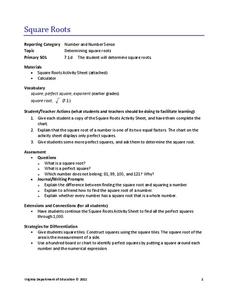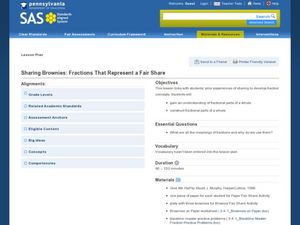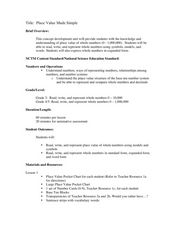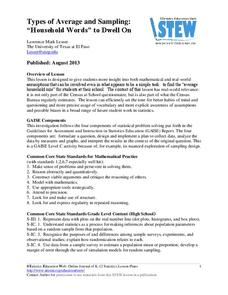Curated OER
Picture Frames and Algebra
Students evaluate the area of a picture frame and write algebraic representations. In this algebra lesson, students work in groups to find the area of different picture frames. Students then write algebraic expressions and present...
Curated OER
Exponents III- Squares and Square Roots
Students explore the process of inverse operations to solve square root problems. After exploring the perfect squares and area, students examine methods to find square roots by observing the teacher, taking notes, and listing vocabulary...
Curated OER
Connecting the Dots? Geometry and Architecture
Students examine the connection between geometry and architecture. In this geometry and architecture lesson, students view a video which details a geometry class design project. Students then use the Internet in a scavenger hunt to find...
Curated OER
Operations on Polynomials
Students simplify and reduce polynomials. For this algebra lesson, students find the sum, difference, product and quotient of polynomials and monomials. They use the order of operation correctly.
Virginia Department of Education
Square Roots
Square away any doubts about using a new resource. Pupils learn about squares and square roots in the mini-lesson. They complete a worksheet identifying roots of perfect squares up to 400.
Curated OER
Chapter 4 Word Search
In this math worksheet, students locate and identify various vocabulary terms related to mathematics. There are seven words located in the puzzle to find.
Curated OER
Chapter 8 Word Search
In this math worksheet, students locate and identify various vocabulary terms related to mathematics. There are eight words located in the puzzle to find.
Alabama Learning Exchange
Exponents and Division
Create a human fraction to learn about division of exponents. Scholars develop the rule for division of exponents by being part of a human fraction to explore and justify the rule. They also consider zero exponents and negative exponents.
EngageNY
Successive Differences in Polynomials
Don't give your classes the third degree when working with polynomials! Teach them to recognize the successive differences and identify the degree of the polynomial. The lesson leads learners through a process to develop an understanding...
Utah Education Network (UEN)
Solving Single-Variable Equations Part II
Brainiacs explore the concept of solving single-variable equations.They use inverse operations to solve equations, and participate in activities such as balancing an equation scale. This is an awesome lesson, complete with game...
Texas Instruments
Graphs of Rational Functions
Take your kids on a tour of graphing rational functions. Using this TI lesson, high schoolers identify the end behavior of their functions. They find the domain and range, describe end behavior, and look at asymptotes and restrictions of...
Curated OER
Ratios And Scale
students investigate the concept of using a ratio in the work of construction and solve problems using real life applications. They read descriptions of how various types of construction professionals use ratios on the job. The lesson...
Pennsylvania Department of Education
Using Polygons to Represent Fractions
Explore the world of fractions by using pattern blocks to show how different shapes can divide a hexagon. Elementary schoolers work in groups to complete these problems and to answer questions. Later, they work complete an independent...
West Contra Costa Unified School District
Matching Quadratic Functions
Ever sigh when learners ask why they have to know so many different forms of the quadratic equation? Here is a lesson that comes in handy! Using hands-on matching activities, quadratic equations are explored through...
EngageNY
Why Call It Tangent?
Discover the relationship between tangent lines and the tangent function. Class members develop the idea of the tangent function using the unit circle. They create tables of values and explore the domain, range, and end behavior of...
EngageNY
Why Were Logarithms Developed?
Show your class how people calculated complex math problems in the old days. Scholars take a trip back to the days without calculators in the 15th installment of a 35-part module. They use logarithms to determine products of numbers and...
Alabama Learning Exchange
Time to Tell Time
Students demonstrate how to tell time using an analog clock. In this time measurement lesson, students read the book Clocks and More Clocks and use analog clocks to demonstrate the time that the teacher called out.
Curated OER
Sharing Brownies: Fractions That Represent a Fair Share
Elementary graders discover the concept of fractional pieces of a whole. They investigate the meanings of fractions in everyday life and why they are used. Pupils divide brownies amongst each other to demonstrate the use of fractions...
Curated OER
Place Value Made Simple
Elementary schoolers explore place value to the millions place. They construct and evaluate the value of numbers. Working in small groups, pupils problem solve with pocket place value charts, and examine standard and expanded forms. This...
Curated OER
Matrix Analysis of Networks
Explore the connection between a finite graph, a directed graph, and a matrix. Graph lines and identify the relationship of matrices in real-world scenarios. Then use this information to work with a partner to plan and design a...
Arizona Department of Education
Introduction to Integers
Welcome to the backward world of negative numbers. This introductory lesson teaches young mathematicians that negative numbers are simply the opposite of positive numbers as they use number lines to plot and compare...
National Security Agency
Going Green with Graphs
In this unit designed for second graders, youngsters are introduced to conducting surveys and creating tally charts based on the data they gather. Students then construct bar graphs, and observe the relationships between the two...
Pennsylvania Department of Education
What is the Chance?
Fourth and fifth graders make predictions using data. In this analyzing data instructional activity, pupils use experimental data, frequency tables, and line plots to look for patterns in the data in order to determine chance. You will...
Statistics Education Web
Types of Average Sampling: "Household Words" to Dwell On
Show your classes how different means can represent the same data. Individuals collect household size data and calculate the mean. Pupils learn how handling of the data influences the value of the mean.























